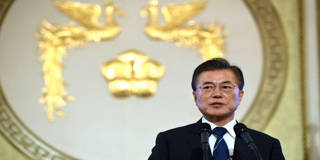South Koreans are now focused less on developments in North Korea and more on their own economic concerns. Addressing those concerns – and thus ensuring continued support for inter-Korean cooperation – will require practical solutions to structural issues, not more redistributive policies.
SEOUL – Since taking office in May 2017, South Korean President Moon Jae-in has worked hard to secure a détente on the Korean Peninsula. He has met with North Korean leader Kim Jong-un three times this year, and agreed to convert the Korean Armistice Agreement into a full peace treaty, improve inter-Korean exchange and cooperation, and work toward “complete denuclearization” on the peninsula. On the economic front, however, Moon has been less successful. And that weakness is increasingly undermining his leadership.

SEOUL – Since taking office in May 2017, South Korean President Moon Jae-in has worked hard to secure a détente on the Korean Peninsula. He has met with North Korean leader Kim Jong-un three times this year, and agreed to convert the Korean Armistice Agreement into a full peace treaty, improve inter-Korean exchange and cooperation, and work toward “complete denuclearization” on the peninsula. On the economic front, however, Moon has been less successful. And that weakness is increasingly undermining his leadership.